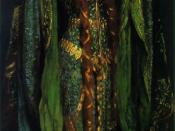[Type text] [Type text] [Type text]
1
Hanson
Sarah Hanson
Mr. Bourguignon
ENG 3U
Monday, May 19, 2014
Stereotypical Gender Roles: A Look at Gender Roles in Shakespeare's Macbeth
Gender roles in society have been categorized into strict classifications that when tempered with cause trouble and conflict. In William Shakespeare's Macbeth, gender roles follow the stereotypical division between man and woman. Firstly, women in the play are perceived as weak, feeble and useless while men in the play are perceived as noble, strong and useful. Secondly, when women live up to the perceived ideal they end up dead while when men live up to the perceived ideal they are praised. Thirdly, when women fall short of the perceived ideal they are seen as the people who cause Macbeth to kill, while when men fall short of the perceived ideal they end up dead. Thus by studying the gender roles within Macbeth, it is easy to see the division between what is considered masculine and what is considered feminine.
To begin with, women in Macbeth are being portrayed as weak, feeble and useless. Firstly, when Lady Macbeth is not told the reason for the commotion after Macduff finds Duncan dead, women are perceived as weak. Macduff instead tells Lady Macbeth, "O gentle lady, / 'Tis not for you to hear what I can speak. / The repetition in a women's ear / Would murder as it fell"(2.3.96-99). Macduff only refuses her access to the knowledge of the commotion because she is a lady, after Banquo asks he quickly divulges the murder of Duncan. Secondly, when Lady Macbeth is overtaken by guilt from killing Duncan she quickly becomes ill. In the third act, her character changes from the strong, willful person that forced Macbeth to kill Duncan to the weak,


